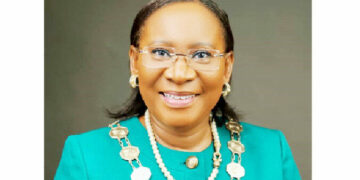As the federal and state governments are intensifying efforts to improve learning in public schools through e-learning platforms, LEADERSHIP findings have shown that the problems of poor infrastructure, slow internet access, erratic power supply, among others have been hampering the effectiveness of e-learning in the country.
The outbreak of COVID-19 impacted on global educational system thus further making technology an all-important tool in every teaching-learning environment. From global statistics, over 1.2 million children are out of school as a result of the effect of COVID 19. This strengthened the need for e-learning platforms across the globe, where teaching/learning is now being carried out remotely on digital platforms.
In Nigeria, the Federal Ministry of Education inaugurated a free e-learning website known as inspire.education.gov.ng for all levels of education to facilitate easy learning access. According to the ministry, the website could accommodate two million Nigerians at a time.
Last month, the Federal Executive Council (FEC) announced that it has approved N964 million for the provision of satellite-based education system equipment in three primary schools in each of the 36 States of the Federation and the Federal Capital Territory, Abuja in order to deepen e-learning in the country.
Recently, the Kaduna State government launched an E-learning portal known as ‘‘Nigeria Learning Passport.’’ Other states like Lagos have also introduced e-learning platforms for students in their states to further deepen access to quality education. However, LEADERSHIP Data mining department digs into factors hampering effectiveness of e-learning in Nigeria.
Poor Infrastructure
Research by LEADERSHIP Data mining department showed that with low ranking in infrastructure and internet accessibility, e-learning lacks the prerequisite technology to thrive in Nigeria. For many Nigerians, it appears government’s approach to solving the problem falls below expectation.
For instance, some Nigerians have expressed skepticism on the N964 million recently earmarked for e-learning in the twilight of Buhari administration saying it may end up as another abandoned project. They said with the level of unstable and epileptic power supply in the country, it was not feasible to have a seamless e-learning programme running effectively in primary schools.
Erratic power supply is obviously one of the biggest setbacks to virtual learning in Nigeria. All devices used in the virtual learning process requires constant and a steady power supply to function. This irregular power supply denies students from properly utilising the already free installed wireless connection in their various schools.
Speaking at a webinar, the chairman, Governing Council National Open University of Nigeria (NOUN) and former executive secretary, National University Commission (NUC), Prof. Peter Okebukola, said the poor state of infrastructure in the country, the ill-readiness of the students and teachers, are affecting the use of technology in advancing teaching and learning across the country.
LEADERSHIP findings showed that at the base of e-learning is technical infrastructure development. Experts believe that with Nigeria’s poor infrastructural development, the prospect of e-learning remains a big hurdle to scale. Many said despite the fact that internet connectivity has come a long way globally, sub-Saharan Africa, particularly Nigeria is still struggling with poor internet infrastructure leading to high internet poverty.
Digital infrastructure in Nigeria is still very poor and where they exist, consumers do not enjoy high-speed internet due to the prevalence of mobile broadband. Statistics has shown that mobile broadband penetration in the country is at 40 percent below the global average rate of 56 percent
Information technology expert, Felix Ojo, said despite the impressive development of the Information and Communication Technology (ICT) following market liberalisation in 2000, the sector is under immense political and regulatory pressure. He said the detriment remains the inability of the country to effectively adapt to the demands of the time which has an adverse effect in deepening e-learning and its accompanying benefits.
Cost Of Data
This is another problem hindering e-learning in the country. Internet access cost in Nigeria is still very high. Nigeria has ranked 43rd among countries with exorbitant data charges globally.
Ranked: countries with the cheapest internet in the world 2022
The countries with the cheapest internet in the world have been ranked for 2022.
This makes it difficult for students to afford the cost of data in Nigeria which is not pocket-friendly when compared to other countries. So many times, parents buy a data plan for their children but will not be able to account for what it was used for before it finishes. This really affect students, most especially, when the virtual learning involves online facilitation, online streaming etc. because all of these consumes a lot of data.
Network Coverage
A lot of students live in villages and rural areas with little or no network coverage at all. In most of the villages, they still make use of the 2G network. This stand as a hindrance of the virtual learning system which should require nothing less than a 3G-above network for greater efficiency.
Ease Of Location
For students who don’t have smart phones to access the internet, they settle for using the various cyber cafes scattered around their areas. Most times, the experiences of such students are discouraging.
Why E-Learning Flops In Nigeria’s Public Universities
Stakeholders and technology experts said e-learning flopped in Nigeria’s public universities because of failure of successive governments to invest in technologies and to support infrastructure, quality network connectivity and inadequate training for lecturers and non-academic staff.
They also identified other stumbling blocks like epileptic power supply, erratic internet networks, limited access and penetration of the Internet. They added that most of the universities were ill-equipped for online education and that most students in public universities could not afford laptop, smartphone, or tablet, while public universities lacked the infrastructure, funding, flexibility and personnel to make a switch to online teaching at short notice.
They noted that private universities, compared to their public counterparts, were more modern in terms of laboratories, ICT and other teaching equipment, and were more flexible in governance and administrative structures.
IT experts and education stakeholders also said government needs to invest in infrastructure, while training and retraining lecturers and teachers on new technology applications to making the switch possible. They said the recurring problem of underfunding would not make e-learning work in the nation’s public universities.
Prof. Okebukola, who is also a professor of Computer Science Education, said the poor state of infrastructure in the country, the ill-readiness of the students and teachers, are affecting the use of technology in advancing teaching and learning across the country. He further explained that on e-learning, Nigeria has only 60 per cent state of e-readiness on the part of the students and 40 per cent state of e-readiness on the part of the teachers to adopt technology education. He however said the e-readiness state of secondary schools across the country is 30 per cent.
He projected that by 2027, 65 per cent of secondary school classes would be technology-based in order to drive e-learning across the country, while 65 per cent of classrooms and workshops at the university level, would also be technology-based, in order to enhance e-learning across Nigerian universities. He added that university teachers, including secondary school teachers, must be digitally literate and equipped in order to impart digital skills and drive e-learning in every learning environment.
Stakeholders want the federal government to find a way to reduce the cost of data, it could be in the form of subsidy for students and the academic staff. This, they said, will greatly encourage the adoption of e-learning system. Also, education stakeholders, want telecommunication companies to equally find a way to have the same spread of their network all around the country. This is believed will enable students both in the rural and urban areas have uninterrupted and stable network supply to access the internet at all time in any place of their choice.
Above all, what all Nigerians want is for the government to create an avenue where the entire country would enjoy a 24hrs uninterrupted power supply. This is expected to keep all the devices required for virtual learning up and running.
LEADERSHIP Data reports that the web became available in Nigeria in 1996 with full internet access by 1998, and by 2001, there were over 150 ISPs licensed by the Nigerian Communications Commission (NCC).





